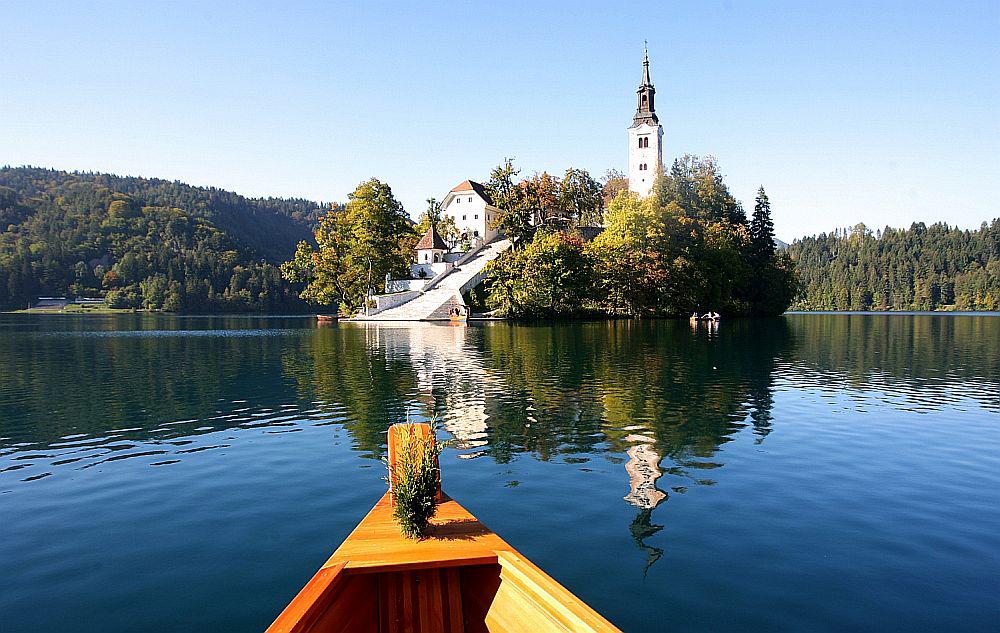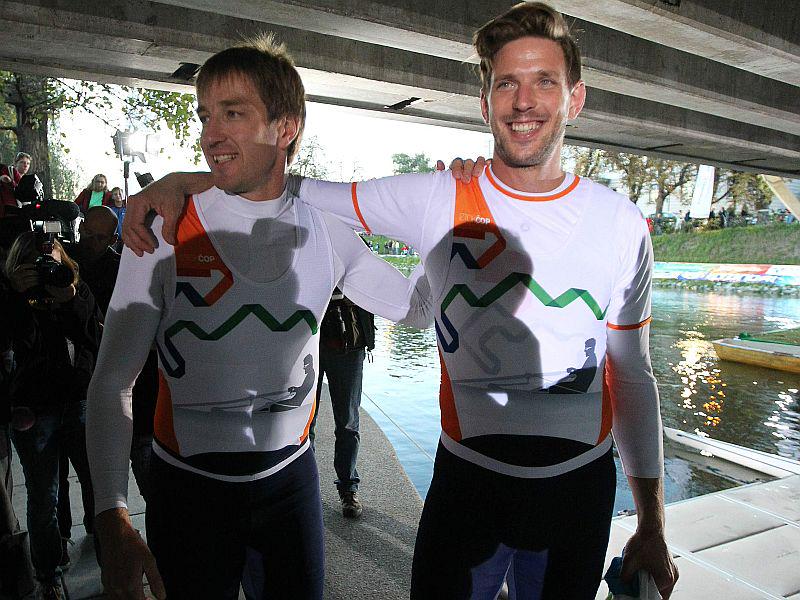
Despite having reached the end of his racing career, Iztok Čop still likes to take to the water and now and then still enjoys training: “Yes, I still train a little. Occasionally. I am not completely out of the rhythm yet. However, when I come to Bled and see the training schedule but the weather is bad, I am not in the least sorry. The boys have to go out on the lake whatever the weather conditions, but I can decide to do as I please. It is the beauty of Bled and the local rowing knowledge that made me persist in rowing for three decades.”

Owing to its natural beauty, it is known as the best and most beautiful rowing course in the world, a kind of Slovenian Wimbledon of rowing, which can boast of having already organised four world championships, the last in 2011.
The secretary-general of the Rowing Federation of Slovenia, Jernej Slivnik, explains that sportsmen and visitors are keen to keep returning to the town and its lake. The first recorded regatta in Bled, which brought a medal to the local team, was in 1905, though rowing clubs on the Slovenian coast existed as long ago as the 19th century. The Bled Club was established in 1949 and a rowing federation, whose members first participated at the Olympic Games in 1956, followed three years later. In the 60s, two coaches – former rowers Miloš Janša and Stanko Slivnik – got to work on reorganising the club, paving its way to a place among the best in the world.
In 1992, soon after Slovenian independence, two rowers – Iztok Čop, one of the most successful Slovenian athletes of all times, and Luka Špik – started to participate in competitions. Čop is the holder of the Olympic rowing gold medal from Sydney (2000), the silver from Athens (2004) and bronze medals from Barcelona (1992) and London (2012); as if this were not enough, he is also a quadruple world champion. Špik is the holder of three Olympic medals. In 2013, he started the season without his long-term partner in the double scull Iztok Čop, who finally retired from competition last year. Even in the post-Olympic season of 2013, centring his efforts on the competition in the single scull, he is aiming for top places.
The main architect of Slovenia’s rowing success story
Miloš Janša remains the coach of the Slovenian rowing teams for the period 2013–2016, thus retaining the position he has held ever since independence. Under his leadership, rowing in the independent Slovenia has, among other achievements, brought home five Olympic medals. The 63-year old lawyer from Bled is the main architect behind the Slovenian rowing success story and the coach of the majority of our crews that have been winning medals at the Olympics and world championships since the 1980s. He participated as a competitor himself in the 1972 Olympic Games in Munich, and in 1976 he started to coach for the Bled rowing club.
The new Olympic cycle also entails major changes in the Slovenian rowing crews. The overall objective is to make use of the asset of Luka Špik’s experience and, even after the departure of Iztok Čop, do everything possible to continue attaining top results and winning medals. At the same time, more energy will be dedicated to bringing forward competitive young talent. Although rowing is a relatively demanding sporting discipline, the boys – most of them locals from Bled – are used to hard work and the training conditions are good. They start training at the age of 12, when their bodies are still developing. During training, the biggest strain is on the back, so back pain is a common complaint among rowers. Great emphasis is laid on achieving a technique that ensures the desired speed with maximum output of oar resistance and correct movement in the boat. Thus good technique complements the rower’s strength.
The club also takes pride in the rowing centre that they established in the 1950s and renovated in 2011. This is one of the most beautiful centres in the world, Mr Slivnik says proudly; when there is a competition, everything runs smoothly, like clockwork.
Partnership agreement between Bled and Henley
A partnership agreement has been concluded between two world-renowned rowing centres. Henley-on-Thames is the famous venue of the prestigious Royal Regatta, organised every year since 1839. And it was the Bled and wider Slovenian rowing tradition and outstanding sporting achievements that convinced the councillors of Henley to unanimously support the partnership with Bled. Henley too is a cradle of rowing sports: the Royal Regatta has a longstanding and unbroken tradition and it is also the home of Leander Club, one of the oldest and most successful rowing clubs in England and indeed the world. Among the members of the club is the sporting legend Steven Redgrave, who won five gold medals at five consecutive Olympic Games and at last year’s Olympics in London was among the final bearers of the Olympic torch. The town is also famous for its excellent Rowing Museum, which keeps a rich collection showing the entire history of the development of the sport. This year, part of this exhibition will be dedicated to Bled. In 2007, the world-famous Royal Regatta, which traditionally takes place in the end of June, was also attended by Iztok Čop and Luka Špik, who won in the double scull event.
Vesna Žarkovič, SINFO
Despite having reached the end of his racing career, Iztok Čop still likes to take to the water and now and then still enjoys training: “Yes, I still train a little. Occasionally. I am not completely out of the rhythm yet. However, when I come to Bled and see the training schedule but the weather is bad, I am not in the least sorry. The boys have to go out on the lake whatever the weather conditions, but I can decide to do as I please. It is the beauty of Bled and the local rowing knowledge that made me persist in rowing for three decades.”

































































